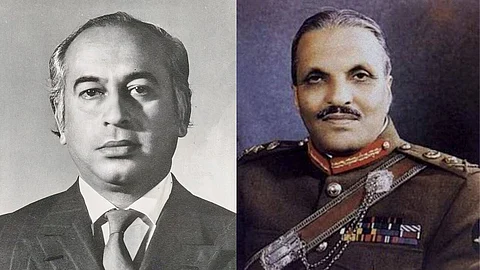
- Home
- न्यूजग्राम
- NewsGram USA
- India
- World
- Politics
- Entertainment
- Culture
- Lifestyle
- Economy
- Sports
- Sp. Coverage
- Misc.
- NewsGram Exclusive
- Jobs / Internships

Bhutto promoted General Zia-ul-Haq, believing him to be a submissive and non-threatening officer
Personal anecdotes—like Zia wiping Bhutto’s shoe—reflect Bhutto’s misjudgment of his loyalty.
Zia staged a military coup in 1977, later executing Bhutto in 1979
Zulfikar Ali Bhutto’s life remains one of the most dramatic and consequential political sagas in South Asia. As Pakistan’s charismatic former Prime Minister, Bhutto’s contributions to the nation were significant: he gave Pakistan its 1973 Constitution, founded the Pakistan Peoples Party (PPP), and emerged as a powerful orator and advocate for a modern, democratic Pakistan. Yet, the same narrative is deeply shadowed by betrayal, ambition, and irony—embodied most sharply in the figure of General Mohammad Zia-ul-Haq.
In Born to Be Hanged, a political biography by Syeda Hameed, the story of Bhutto’s political rise and ultimate fall is narrated with vivid detail. Hameed, a human rights activist and former member of India’s Planning Commission, examines Bhutto’s career, his appeal among the masses, his strong stances on international platforms like the United Nations, and his complex relationship with military power in Pakistan. The book highlights Bhutto’s hatred for Ayub Khan, his refusal to surrender Kashmir, and the ambition that gradually blinded him to threats lurking within his own political and military circle.
One of the book’s most striking anecdotes involves General Zia-ul-Haq. During a high-level meeting, Zia pulled back Bhutto’s chair to let him sit. Bhutto, turning to his aide Rao Rashid, asked with a smirk, “Why did we make him General?” Rao replied that when a U.S. delegation was presented with a list of officers for promotion, they had struck out Zia’s name, noting, “Bekar aadmi” (useless man). Bhutto reportedly laughed and said, “That’s why we chose him,” believing Zia to be a flatterer rather than a threat.
Hameed recounts another symbolic incident: something dirty fell on Bhutto’s shoe, and Zia instinctively pulled out his handkerchief to clean it. Bhutto, amused, placed his foot on the table, mocking Zia’s eagerness to please. But that very man would soon orchestrate Bhutto’s downfall.
General Mohammad Zia-ul-Haq, born on August 12, 1924, in Jullundur, Punjab (now in India), had a long military career beginning with his commissioning from the Royal Indian Military Academy in 1945. He served in World War II and rose steadily through the ranks of the Pakistan Army. By 1972, he was a major general and had led military trials against officers allegedly involved in a coup against Bhutto’s government. Recognizing his apparent loyalty, Bhutto promoted Zia to lieutenant general in 1975 and made him Chief of Army Staff in 1976.
But on July 5, 1977, Zia staged a bloodless coup, ousting Bhutto and assuming the role of Chief Martial Law Administrator. He later became President after Fazal Elahi Chaudhry’s resignation. In 1979, Zia oversaw Bhutto’s execution on charges of conspiracy to commit murder, despite widespread doubts about the fairness of the trial. He banned political parties, imposed censorship, prohibited strikes, and ushered in a U.S.-backed military buildup in response to the Soviet invasion of Afghanistan. Zia also launched a controversial Islamization campaign that reshaped Pakistan’s social and political landscape. He remained in power until his death in an airplane crash in 1988.
The tale of Bhutto and Zia is a cautionary one—of misjudged loyalties, unchecked power, and tragic irony. The man Bhutto once mocked for wiping his shoe rose to become the architect of his downfall and execution. [Rh/VP]
